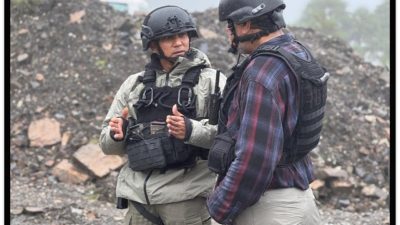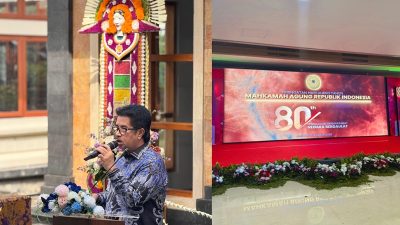Indonesiantalk.com — Andri Hopes Constitutional Court’s Decision Will Be Careful Regarding PUPN
Jakarta, – Andri Tedjadharma, a shareholder of Bank Centris Internasional (BCI), is awaiting justice from the Constitutional Court (MK) ruling. He is requesting a judicial review of the authority of the State Receivables Affairs Committee (PUPN) based on Government Regulation in Lieu of Law (Perpu) Number 49 of 1960.
Andri is forced to challenge the PUPN’s authority because it has treated him unfairly. The PUPN has confiscated his personal assets, including his only home, and is planning to auction it off simply because Andri was accused of receiving Bank Indonesia Liquidity Assistance (BLBI) funds. Yet, Andri has not received a single rupiah of BLBI funds.
The reason was that the funds were transferred to another account, a mysterious account in the name of Centris International Bank (CIB).
“I was wronged. I was accused of receiving BLBI. I became a victim. Where else can I seek justice? Who can protect me from the arbitrariness of the former BLBI Task Force and PUPN,” he said softly, filled with anguish.
Andri emphasized that there should have been a court ruling and an audit result from the Supreme Audit Agency (BPK) as the basis for his BLBI receipt. However, in fact, both the PTUN (State Administrative Court) and the appeals court rulings, Andri was found not guilty and did not receive a single cent of BLBI.
Not only the PTUN and District Court rulings, but the BPK audit also did not list Andri Tedjadharma or Bank Centris Internasional as recipients of BLBI funds. So why was he accused by the Director General of State Assets (DJKN) of participating in BLBI funds?
“The accurate explanation of the BPK audit of Centris International Bank Number 523,551,000 at BI, an individual type, was used as evidence in the South Jakarta District Court. In fact, the one being sued was Bank Centris Internasional Number 523,551,0016,” said Andri.
“This is a clear difference between Centris Internasional Bank (CIB) and Bank Centris Internasional (BCI), both in terms of the names and account numbers. BI transferred BLBI funds to CIB’s account, but I and Bank Centris Internasional (BCI) were held responsible, as they did not receive a single rupiah from the BLBI transfer,” he added.
According to Andri, there are two things to consider in the Bank Centris case. This is because there was intent, or mens rea, in the agreement between Bank Centris Internasional and Bank Indonesia:
First, there are two deeds, Deed Number 75 and Deed Number 76, with identical content. However, one uses collateral, while the other does not. “So this was premeditated,” Andri said.
Second, there are two accounts with similar bank names, one belonging to BANK CENTRIS INTERNATIONAL (BCI) with Number 523.551.0016.
“And there’s a similar bank using the Centris name, with a different account number. This bank originated from an unknown source and is still not registered with the Bank of Indonesia (BI). The office, management, and owner are unknown, but the last registered bank was in 2004,” he stressed.
In fact, Andri continued, the Centris International Bank (BCI) he managed with account number 523.551.0016 was located at Plaza Centris, Jalan HR Rasuna Said, and operated until 1998.
“However, the Centris name was still used until 2004 under the name CENTRIS INTERNATIONAL BANK (CIB) Number 523.551.000 for individual accounts, and was promoted to a foreign exchange bank. Its office address was listed at the UPINDO building on Jalan HR Rasuna Said,” Andri emphasized.
There were two BPK audits: one conducted by the BPK on CIB No. 523,551,000 at Bank Indonesia, which was used as evidence by IBRA at the South Jakarta District Court in 2000, and another conducted by an independent auditor in 2003 for BCI, whose auditors concluded that its fairness was questionable due to the lack of evidence.
“And to this day, Bank Centris Internasional No. 523,551,0016 has never received or seen its bank statement, which was seized during the forced closure of the bank by IBRA,” he said.
“So it’s somewhat confusing how a company can be audited without a bank statement, whether at Bank Indonesia or another bank, and how a shareholder can be designated as a guarantor of debt to the state without a bank statement and without a signed APU MRNIA MSAA and/or personal guarantee?” he said.
“There are two decisions. One is a decree issued by the PUPN (State Owned Enterprises Agency) that is legally flawed because it was based on a 2006 Supreme Audit Agency (BPK) audit of IBRA regarding the PKPS program, which did not mention Bank Centris Internasional as a participating bank,” Andri emphasized.
“And there was never any statement about how much Centris or its shareholders owed the state. And the other is a copy of a Supreme Court decision that is not registered with the Supreme Court, meaning it is fake,” he added.
Supreme Court Ruling Controversy Disappears for 20 Years
Supreme Court Decision No. 1688K/Pdt/2003 was a decision that had been silent for almost 20 years. However, strangely, it suddenly emerged and was used as the basis for the State Receivables Affairs Committee (PUPN) to seize the personal and family assets of Andri Tedjadarma, a shareholder of Bank Centris Internasional.
With this odd and suspicious Supreme Court decision, Andri’s rights as a citizen were violated.
Feeling wronged by the PUPN, he then filed a petition for judicial review of Government Regulation in Lieu of Law (Perpu) Number 49 of 1960 concerning the PUPN’s authority with the Constitutional Court (MK). During the trial at the Constitutional Court, the controversy surrounding the Supreme Court’s decision resurfaced when Dr. Maruarar Siahaan testified as an expert witness.
“This is truly shocking, with the cassation ruling No. 1688K/pdt/2003, even though the Supreme Court has stated that it never received a cassation request for the appeal filed by IBRA or PUPN through the Attorney General’s Office. Then, PUPN revised the debt amount from 800 billion to 4.5 trillion because the ruling took so long to be discovered,” Maruarar stated before the Constitutional Court panel of judges.
Maruarar’s statement regarding the Supreme Court’s decision, which was full of irregularities, immediately drew a response from Chief Justice Suhartoyo. He stated that this must be confirmed directly with the Supreme Court.
“It’s truly shocking that a decision was not appealed to the Supreme Court. Why is this decision suddenly out of the blue? This is a big question for the Supreme Court,” Suhartoyo said in response to Maruarar.
Supreme Court Decision No. 1688K/Pdt/2003, strange because it had not been reviewed for 20 years, is a reminder of Zarof Ricar’s criminal conspiracy, a former Supreme Court official, to manipulate and influence the judge’s decision.
The Jakarta High Court has proven that former Supreme Court official Zarof Ricar has been sentenced to 18 years in prison, two years more than the sentence imposed by the Corruption Court panel of judges.
Zarof Ricar’s appeal hearing was held at the Jakarta High Court in Central Jakarta on Thursday (July 24th), with Chief Judge Albertina, Associate Judges Budi Susilo, and Agung Iswanto.
“The defendant is sentenced to 18 years in prison and a fine of Rp 1 billion. The sentence, if the fine is not paid, will be replaced with six months’ imprisonment,” the judge read out.
The panel of judges at the Central Jakarta District Court for Corruption found Zarof guilty of conspiracy and accepting bribes related to the acquittal of Gregorius Ronald Tannur in the death of Dini Sera Afrianti.
Zarof Ricar’s conspiracy to influence the Supreme Court’s decision is a very evil act.
Using a controversial and irregular decision to seize a citizen’s assets, what’s the difference? This controversial Supreme Court decision occurred even after the Zarof Ricar case was uncovered.
The dignity of the Supreme Court must continue to be protected from irresponsible individuals who could damage the Supreme Court’s credibility as the ultimate bulwark on which the public relies for fair legal certainty.
https://theiknpost.com/andri-hopes-constitutional-courts-decision-will-be-careful-regarding-pupn/














